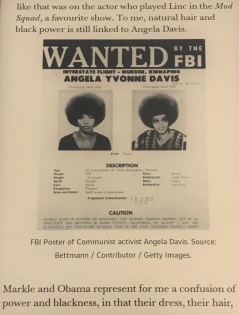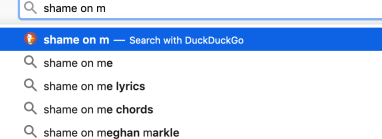a nutshell: this stunningly incisive memoir of identity by Guyanese-born, Canadian-raised, UK-residing author Tessa McWatt is a journey through body and time in attempt to answer the question of what – or rather – who am I?
a line: “Why does race exist? To do the accounting for who will have more and who will have less.”
 an image: in her chapter ‘Hair’, McWatt is sceptical of the notion that Meghan Markle and Michelle Obama (both of who have ‘relaxed’/straightened hair) should be seen as straightforward icons of progress and compares their public image with the FBI’s ‘Wanted’ poster for Angela Davis – McWatt presciently disputes the idea that Prince Harry’s marriage demonstrates a new, non-racist Britain (Shame on Me was published before the UK’s rabid press essentially forced Markle to leave the country); with all this in mind, it’s worth noting the exasperating search results when I started to type in this book’s title >>>
an image: in her chapter ‘Hair’, McWatt is sceptical of the notion that Meghan Markle and Michelle Obama (both of who have ‘relaxed’/straightened hair) should be seen as straightforward icons of progress and compares their public image with the FBI’s ‘Wanted’ poster for Angela Davis – McWatt presciently disputes the idea that Prince Harry’s marriage demonstrates a new, non-racist Britain (Shame on Me was published before the UK’s rabid press essentially forced Markle to leave the country); with all this in mind, it’s worth noting the exasperating search results when I started to type in this book’s title >>>

a thought: having reread Wide Sargasso Sea just last week, I was intrigued by McWatt’s evolving relationship with Jane Eyre & Antoinette/Bertha Mason – the way in which Jean Rhys’ story influenced how she thought about plantation dynamics and how she felt about the time spent by her grandfather (whose surname, coincidentally, was Eyre) in an asylum after a nervous breakdown in what was then British Guiana; McWatt reveals that pyschoanalysis allowed her to access both Jane and Bertha in a less divisive manner
a fact: it continues to sicken me that, as mentioned towards the end of Shame on Me, following the Slavery Abolition Act of 1833 the UK Government paid out what was at the time 40% of its national budget to ‘compensate’ slave owners – huge sums of which the slaves never received a single pound and, on the contrary, many descendants of slaves paid for across nearly two centuries until this enormous debt was paid off in 2015
want to read Shame on Me? visit here


